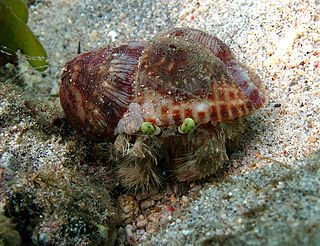The Coniacian is an age or stage in the geologic timescale. It is a subdivision of the Late Cretaceous Epoch or Upper Cretaceous Series and spans the time between 89.8 ± 1 Ma and 86.3 ± 0.7 Ma. The Coniacian is preceded by the Turonian and followed by the Santonian.

Nidularia is a genus of nine species of fungi in the family Agaricaceae. Their fruit bodies resemble tiny egg-filled bird nests. The name comes from the Latin nidus meaning nest. The related genus Mycocalia was segregated from Nidularia in 1961 based on differences in the microscopic structure of the peridium.

Dardanus is a genus of hermit crabs belonging to the Diogenidae family.

Pheladenia deformis, commonly known as blue fairy orchid or blue beard is the only species of the flowering plant genus Pheladenia in the orchid family, Orchidaceae and is endemic to Australia. It was originally named as Caladenia deformis and has since had several name changes. Plants have a single, narrow, hairy leaf and usually blue flowers with relatively short, broad sepals and petals and an unusual labellum.

Pyrulofusus deformis, common name the warped whelk, is a species of sea snail, a marine gastropod mollusk in the family Buccinidae, the true whelks.
Pyrulofusus is a genus of sea snails, marine gastropod mollusks in the family Buccinidae, the true whelks.

Volutopsius is a genus of sea snails, marine gastropod mollusks in the family Buccinidae, the true whelks.

Muricopsis deformis is a species of sea snail, a marine gastropod mollusk in the family Muricidae, the murex snails or rock snails.
Eupithecia deformis is a moth in the family Geometridae. It is found in China (Shensi).

Pterolophia is a genus of longhorn beetles of the subfamily Lamiinae, containing the following species:

Naticopsis is an extinct genus of small sea snails belonging to the family Neritopsidae.
Aneuretellus is an extinct genus of ant in the formicid subfamily Aneuretinae, and is one of eight genera of the subfamily. The genus contains a single described species Aneuretellus deformis and is known from one Middle Eocene fossil which was found in Sakhalin in the Russian Far East.
Pterolophia instabilis is a species of beetle in the family Cerambycidae. It was described by Per Olof Christopher Aurivillius in 1922. It is known from Seychelles.
Pterolophia guineensis is a species of beetle in the family Cerambycidae. It was described by James Thomson in 1864, originally under the genus Alyattes.
Heliophanus deformis is a jumping spider species in the genus Heliophanus. It was first described by Wanda Wesołowska in 1986 and is found in Angola.

Dardanus deformis is a species of nocturnal hermit crab that is found in the Indo-Pacific. Its common name is pale anemone hermit. The species is known to transfer sea anemones from one shell to another when it moves to a different shell. It can be kept in an aquarium.

Cremnoceramus is an extinct genus of fossil marine pteriomorphian bivalves that superficially resembled the related winged pearly oysters of the extant genus Pteria. They lived from the Turonian to the Maastrichtian of the Late Cretaceous.

Cladonia deformis, also known as the lesser sulphur cup or the lesser sulphur cup lichen, is a light-coloured, fruticose, cup lichen belonging to the family Cladoniaceae. This lichen was first described as Lichen deformis by Carl Linnaeus in 1753, and transferred to the genus Cladonia in 1796 by Georg Franz Hoffmann.

Leucopogon deformis is a species of flowering plant in the heath family Ericaceae and is endemic to eastern coastal Australia. It is a bushy shrub with narrowly egg-shaped leaves, and white, tube-shaped flowers.











